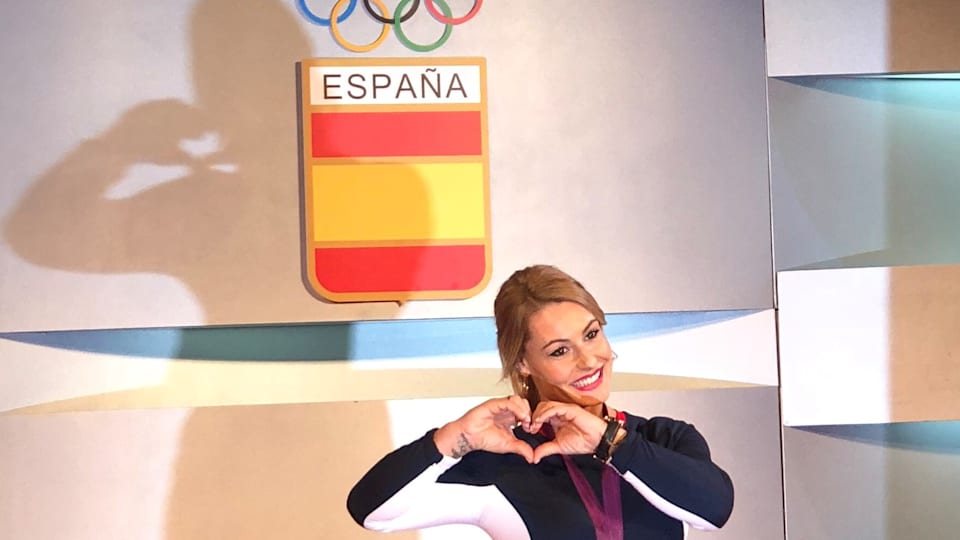Lydia Valentin has received her reallocated London 2012 Olympic gold medal in weightlifting
The Spanish weightlifter originally finished in fourth place but the top three competitors have since been disqualified due to doping.

It was an emotional moment for Lydia Valentin.
Six-and-a-half years after London 2012, the Spanish weightlifter finally received recognition as an Olympic champion.
Surrounded by her parents and family members, the 34-year-old was finally given her gold medal at a ceremony organised by the Spanish Olympic Committee in Madrid.
I'm finally the Olympic champion. I'm so excited. I still can't believe it. It is one of the happiest days of my life. - Lydia Valentin to Olympic Channel
Valentin had finished fourth in 2012 but all three athletes who were on the podium that day were found to be using a banned substance when their test results were reanalysed.
“I wasn’t able to enjoy the podium at the time but the important thing is that the cheaters have been caught,” Valentin said at the event, which was filmed as part of the Olympic Channel documentary series 'Take the Podium'.
The ceremony in Spain had the athlete in tears as she adds to her Olympic bronze medal from Rio 2016, a silver from Beijing 2008.
London 2012
The women’s -75kg category at London 2012 saw Svetlana Podobedova of Kazakstan take first place.
Just before Rio 2016, the International Weightlifting Federation (IWF) announced that Podobedova had failed drug tests.
Natalya Zabolotnaya of Russia and Iryna Kulesha of Belarus finished in second and third place but were also disqualified after the samples were reanalysed.
Abeer Abdelrahman of Egypt has already received her reallocated silver medal.
"Fainting and injuring myself at the (London) Olympics was one of the most intense moments in my life, yet hearing about the Olympic medal made me forget every moment of pain or fatigue,” she said.
Madias Nzesso of Cameroon is the new recipient of the bronze medal.
Beijing 2008
Lydia Valentin also had her placement from fifth at Beijing 2008 upgraded to second after tests were reanalysed.
Three Chinese athletes, Cao Lei, Liu Chunhong and Chen Xiexia, were found to be using a substance (GHRP-2) which stimulates growth hormone production.
The records now have Alla Vazhenina of Kazakhstan and Mexico’s Damaris Aguirre as the athletes who won gold and bronze respectively.
IOC reanalysis
The International Olympic Committee (IOC) has been storing samples so that re-tests can use state-of-the-art methods.
These new tests uncovered banned substances that had gone undetected at the time.
Despite the reallocation, the clean athletes still miss out on their moment on the podium.
“I can only imagine the disappointment of athletes who have had their special moment taken away due to cheating,” said two-time Olympic champion, Kirsty Coventry.
Kirsty Leigh COVENTRY
“We are taking every possible step to ensure fair competition and recognise the achievements of clean athletes.
“Firstly, by a comprehensive and robust retesting programme, and, secondly, by taking every possible step to ensure those cheated athletes receive their special moment on their terms,” the IOC Athletes’ Commission Chair added.
Now, athletes can choose from six options:
- The next Olympic Games (for reallocations from PyeongChang 2018 onwards)
- The Youth Olympic Games
- The IOC headquarters or Olympic Museum
- At a National Olympic Committee function
- At an International Federation event or function
- To have a private ceremony
“This decision once again underlines how integral athletes are to the decision-making processes within the International Olympic Committee and the big strides that are being taken to restore trust across the Olympic Movement at large,” Coventry also said.
You can follow Lydia Valentin’s medal reallocation across our social platforms. Follow Olympic Channel on Instagram, Twitter and Facebook.
